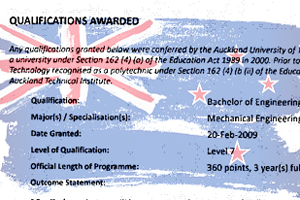
Qualification frameworks (QFs) are found around the world in countries that have a centralized, government-regulated educational system. Generally they are created and monitored by a body dedicated specifically to the care and maintenance of the QF, but the QF generally is just one component of a larger structure, such as a ministry of education. The QF body usually interfaces with other organizations working to implement policies and goals in the spheres of education and training.
The New Zealand QF (NZQF) provides an introduction to the concept and function of a QF. Below are the basic definitions of both “qualification” and “qualifications framework," as defined by Ron Tuck (
An Introductory Guide to National Qualifications Frameworks: Conceptual and Practice Issues for Policy Makers, International Labour Organization, 2007):
Qualification: A credential awarded upon completion of a program of education or training.
Qualifications framework: A structure for defining, understanding, and presenting education and training credentials awarded in a centralized educational system, relative to each other in terms of level and purpose. A QF is an agent as well as product of these processes.
New Zealand was among the first countries to create a National Qualifications Framework, arising from needs identified through social, political and economic changes in the country at the time.
Learn more about the history and current iterations of NZQF, as well as the evolution of QFs around the world in this brief white paper from AACRAO International.
Related Content
International Admissions GPS: The Road to Success
Preconference workshop at AACRAO 2019 in Los Angeles
Sunday, March 31
Our trip starts with basic strategies in international admissions, as well as the knowledge base and skill set needed for credential evaluation. You'll be guided by reliable resources, but stay alert for the potholes of fraud! Share highlights of your trip by applying what you’ve learned using case studies based on actual sample documents. Arrive at your destination with confidence in your work.
AACRAO International on the Road
Florida International University
March 14 - 15, 2019